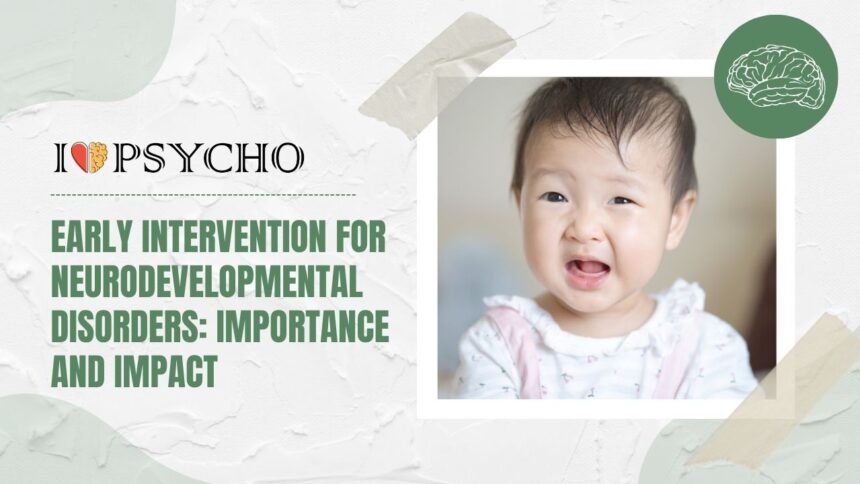Introduction to Neurodevelopmental Disorders
Welcome to a journey into the world of early intervention for neurodevelopmental disorders! Neurodevelopmental disorders can present unique challenges, but with the right support and resources, individuals can thrive. Join us as we explore the importance and impact of early intervention in shaping brighter futures for those affected by these conditions.
The Importance of Early Intervention
When it comes to neurodevelopmental disorders, early intervention plays a crucial role in shaping the future of individuals affected by these conditions. Identifying and addressing challenges at an early age can lead to better outcomes later in life.
Early intervention provides children with the necessary support and resources to help them reach their full potential. It focuses on addressing developmental delays, improving communication skills, and enhancing overall quality of life.
By intervening early, therapists and specialists can implement tailored strategies to meet the unique needs of each child. This personalized approach maximizes the effectiveness of interventions and sets the stage for long-term success.
The impact of early intervention extends beyond childhood; it paves the way for improved social interactions, academic achievements, and independence as individuals grow into adulthood. By investing in early support services, we invest in a brighter future for those with neurodevelopmental disorders.
Types of Early Interventions Available
Early interventions for neurodevelopmental disorders come in various forms tailored to meet the unique needs of individuals. One common type is behavioral therapy, which focuses on teaching new skills and reducing problem behaviors through positive reinforcement techniques. Speech therapy is another vital intervention that helps improve communication abilities by targeting language development and articulation.
Occupational therapy aims to enhance everyday functioning by addressing sensory processing issues, fine motor skills, and self-care tasks. Physical therapy plays a crucial role in improving gross motor skills like coordination and balance. Social skills training is essential for enhancing interpersonal interactions and building relationships with peers.
Furthermore, early interventions may involve educational programs designed to support learning challenges associated with neurodevelopmental disorders. Each type of intervention plays a significant role in promoting overall growth and development in individuals with these conditions.
Impact of Early Intervention on Long-Term Outcomes
Early intervention for neurodevelopmental disorders plays a crucial role in shaping long-term outcomes for individuals. By identifying and addressing challenges early on, interventions can help improve cognitive, social, and emotional development over time. Research has shown that timely support can lead to better academic performance, increased independence, and improved quality of life.
Early interventions focus on building essential skills like communication, social interaction, and adaptive behaviors. These skills are foundational for future success in school, work, and relationships. Moreover, by providing targeted therapies and strategies tailored to the individual’s needs, early intervention programs aim to maximize potential and empower individuals to thrive.
The positive impact of early intervention extends beyond childhood into adolescence and adulthood. It not only enhances functional abilities but also reduces the need for extensive support services later in life.
Importance of Continued Support and Resources for Families
Navigating the journey of raising a child with a neurodevelopmental disorder can be overwhelming for families. It is crucial to recognize the importance of continued support and resources in ensuring the well-being of both the individual and their loved ones.
Families often face unique challenges that require ongoing assistance and guidance from professionals who understand their specific needs. Having access to a network of support can provide comfort, information, and practical help in managing daily tasks.
Continued support also plays a vital role in empowering families to advocate effectively for their loved one’s rights and access to necessary services. By staying informed and connected, parents can make informed decisions about treatment options, educational opportunities, and community resources.
Furthermore, having a strong support system can alleviate feelings of isolation or stress that may arise when caring for a child with special needs. Through shared experiences and empathy, families can find solace knowing they are not alone on this journey.
Commonly Used Interventions for Neurodevelopmental Disorders
When it comes to interventions for neurodevelopmental disorders, there is a range of commonly used approaches that have shown effectiveness in supporting individuals. One such intervention is Applied Behavior Analysis (ABA), which focuses on behavior modification techniques to teach new skills and reduce challenging behaviors.
Another widely utilized intervention is Speech Therapy, which helps individuals improve their communication skills and language development. Occupational Therapy is also commonly used to help individuals develop fine motor skills, sensory processing abilities, and improve daily living activities.
Social Skills Training is essential for teaching individuals how to interact with others effectively and navigate social situations successfully. Additionally, Cognitive Behavioral Therapy (CBT) can be beneficial in addressing anxiety, depression, and other mental health challenges often co-occurring with neurodevelopmental disorders.
These interventions are tailored to meet the unique needs of each individual and can make a significant impact on their overall quality of life.
Success Stories from Early Intervention Programs
Imagine a child who struggled with communication skills, receiving early intervention. Through speech therapy and specialized programs, the child gradually began to communicate effectively with others.
Another success story involves a teenager with autism spectrum disorder participating in social skills groups as part of early intervention. Over time, the teen developed friendships and gained confidence in social situations.
Early intervention also supported a young adult with ADHD in developing organizational strategies and coping mechanisms. As a result, they excelled academically and professionally.
These success stories highlight the transformative power of early intervention programs for individuals with neurodevelopmental disorders. Each person’s journey is unique, but all share the common thread of progress and growth thanks to timely interventions.
Challenges and Barriers to Accessing Early Intervention Services
Navigating the world of early intervention services comes with its fair share of challenges and barriers. From long waitlists to limited availability, accessing the necessary support for neurodevelopmental disorders can be a daunting task for many families.
Financial constraints often pose a significant obstacle, as specialized interventions can come with hefty price tags that are out of reach for some. Additionally, geographical limitations and lack of transportation options can make it difficult for families residing in remote areas to access crucial services.
Moreover, the complexity of navigating different systems and understanding eligibility criteria can leave parents feeling overwhelmed and frustrated. The need for advocacy and awareness around early intervention services is paramount in breaking down these barriers and ensuring equitable access for all individuals in need.
How Parents Can Advocate for Early Intervention
Parents play a crucial role in advocating for early intervention services for their child with neurodevelopmental disorders. One way parents can advocate is by educating themselves about their child’s condition and the available interventions. By becoming knowledgeable, parents can effectively communicate with healthcare providers and specialists.
Another way parents can advocate is by actively participating in their child’s therapy sessions and treatment plans. This involvement allows parents to provide valuable insights about their child’s progress and needs, ensuring that interventions are tailored to meet specific goals.
Additionally, joining support groups or connecting with other families facing similar challenges can empower parents to share experiences, resources, and strategies for navigating the system of care. Together, they can amplify their voices and advocate collectively for improved services and access to early intervention programs.
By being proactive, informed advocates for their children, parents can help break down barriers to accessing quality early intervention services while promoting positive outcomes for their child’s long-term development.
Conclusion: The Long-Term Impact of Early Intervention on Individuals with Neurodevelopmental Disorders
Early intervention for neurodevelopmental disorders plays a crucial role in shaping the future of individuals affected by these conditions. By identifying and addressing challenges early on, we can significantly improve long-term outcomes and quality of life for those with neurodevelopmental disorders.
The impact of early intervention is profound, setting the stage for positive development, improved communication skills, enhanced social interactions, and increased independence. It not only benefits the individual but also empowers families to navigate the complexities of raising a child with special needs.
Continued support and access to resources are essential in ensuring that individuals with neurodevelopmental disorders receive ongoing care tailored to their unique needs. Success stories from early intervention programs serve as testimonials to the effectiveness of timely interventions in unlocking potential and fostering growth.
While there may be challenges and barriers along the way, parents play a critical role in advocating for their children’s rights to early intervention services. By being informed, proactive, and persistent, they can help bridge gaps in accessing necessary support systems.
Investing in early intervention for neurodevelopmental disorders is an investment in brighter futures filled with possibilities and opportunities for individuals to thrive despite any obstacles they may face. The impact reverberates far beyond childhood into adulthood, creating a ripple effect of empowerment and inclusion within our communities.









